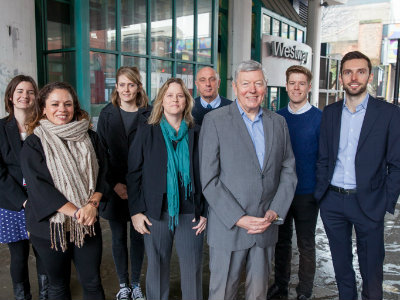
An orphaned 13-year-old and his 16-year-old sister would not, today, be set up in a council flat and left to fend for themselves. What happened to former secretary of state Alan Johnson would be virtually impossible today – but he’s certain this brave decision by his own social worker changed his and his sister’s lives for the better.
Separated and institutionalised
“We could have been separated and institutionalised. We could have ended up having very unhappy lives – we could have ended up as a statistic.”
Johnson, a former health, education and home secretary as well as former chancellor, has cause to reflect on these early experiences after spending a day shadowing trainee social workers, participants in fast-track graduate scheme Frontline, in his home borough of Kensington and Chelsea.
“I realise now how courageous [my social worker] was. It gives you an insight into how there’s no right or wrong way of doing things if you listen to children, meet their needs and anxieties and use your own judgement,” he says.
Champion for good social work
No stranger to poverty and deprivation, he’s a determined champion for the value of good social work and the need to support and bolster social workers, not castigate them. It’s this belief that led him, on a miserable and overcast March morning, to be sitting in on a meeting with a girl in foster care as she updates her social worker on her progress. She’s a success story – troubled and suicidal two years ago, she’s now on track and preparing to sit her GCSEs.
Johnson knows this is one of the less challenging cases the social workers will be faced with.
“[The visit I sat in] wasn’t emotionally draining – if anything it was uplifting, but that’s not to say there aren’t people on the [social workers’] caseload whose situations are far more disturbing, even depressing,” he says.
Calculated risk
He speaks highly of the trainee social workers he witnesses in action – of their professionalism, articulacy, ability to listen, be responsive and build trust. He’s also clear that social workers need to be supported and enabled to take calculated risks and use their own professional judgement. It was a calculated risk that allowed him to stay with his sister:
“[Our social worker] used his judgement but he didn’t just leave it there. He came round and visited us three times a week at first, to watch over us until he could see we were doing OK – he followed through.”
Johnson’s day spent shadowing the trainee social workers has only reinforced his view that children’s social work is one of the country’s toughest jobs and its importance needs to be recognised, he says.
“There has to be accountability of course, but I would be much more concentrated on making sure social workers have the right skills, the right status and that their morale isn’t so damaged that they can’t use their judgement.”


 Bournemouth, Christchurch and Poole
Bournemouth, Christchurch and Poole  Hampshire County Council
Hampshire County Council  Lincolnshire County Council
Lincolnshire County Council  Norfolk County Council
Norfolk County Council  Northamptonshire Children’s Trust
Northamptonshire Children’s Trust  South Gloucestershire Council
South Gloucestershire Council  Wiltshire Council
Wiltshire Council  Wokingham Borough Council
Wokingham Borough Council  Children and young people with SEND are ‘valued and prioritised’ in Wiltshire, find inspectors
Children and young people with SEND are ‘valued and prioritised’ in Wiltshire, find inspectors  How specialist refugee teams benefit young people and social workers
How specialist refugee teams benefit young people and social workers  Podcast: returning to social work after becoming a first-time parent
Podcast: returning to social work after becoming a first-time parent  Podcast: would you work for an inadequate-rated service?
Podcast: would you work for an inadequate-rated service?  Family help: one local authority’s experience of the model
Family help: one local authority’s experience of the model  Workforce Insights – showcasing a selection of the sector’s top recruiters
Workforce Insights – showcasing a selection of the sector’s top recruiters 

 Facebook
Facebook X
X LinkedIn
LinkedIn Instagram
Instagram
I believe very strongly that SW do a very difficult job in circumstances which are becoming more and more demanding due to austerity cuts. Sw’s needs more support and resources not the threat of imprisonment.